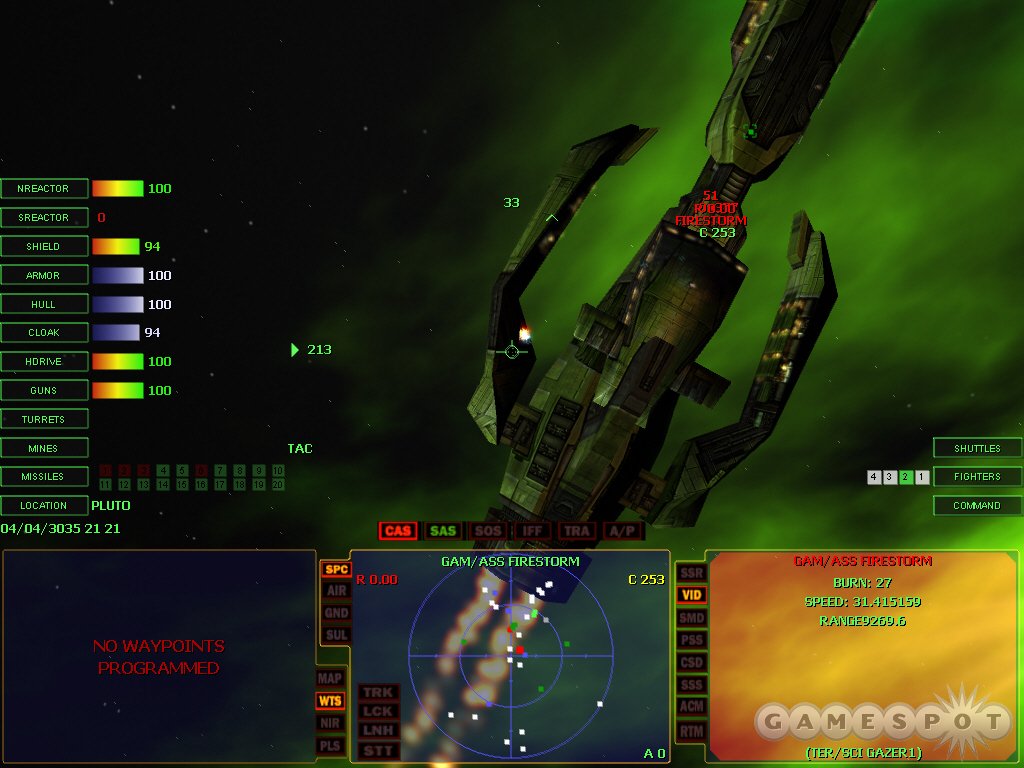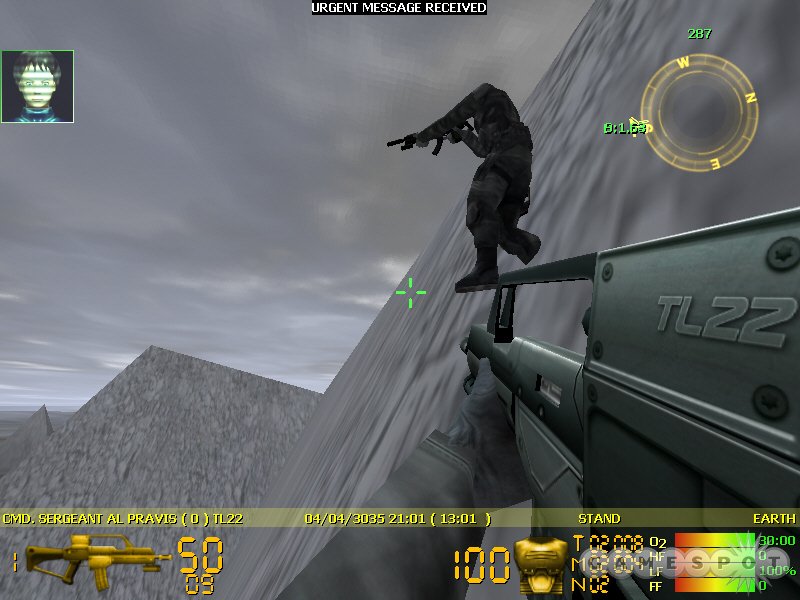While the once mighty space simulation genre has pretty much gone the way of the dinosaurs and the dodo, developer Derek Smart has continued to persevere on his long-running Battlecruiser games. Smart has been working on the Battlecruiser games for a decade now, and the series itself got a name change in 2004. The latest game in the series, Universal Combat: A World Apart, is essentially a stand-alone expansion to 2004's Universal Combat, adding some extra content in the form of campaigns, vehicles, and character classes. It does very little, however, to address Universal Combat's dismal production values, incomprehensible interface, and other issues.

Universal Combat takes its name partly from the fact that you can explore and fight in a huge galaxy, and because you can battle it out as a starship commander, a fighter pilot, and even as a grunt on the ground holding a rifle. However, this broad design is simply too ambitious for its own good, as Universal Combat doesn't really do any of the three particularly well, and it does some of the modes terribly.
At the heart of the game is the starship command simulation, where you take direct command of a gigantic starship. You can fly around the universe in an open-ended and free-form campaign mode or "roam" mode, or you can take your ship into battle in a handful of premade combat missions. However, even though your space carrier flies and fights like an oversized fighter, there's an incredibly steep learning curve that you have to surmount. And while A World Apart actually adds a tutorial to Universal Combat (something sorely missing in the 2004 release), it isn't as helpful as it sounds. The 97-page tutorial is dense, and it requires you to constantly refer to the separate 101-page manual in order to make sense of the alphabet soup of acronyms that it throws at you. In terms of complexity, Universal Combat is about as complex (if not more so) than some of the high-fidelity combat flight simulators out there. So if your idea of fun is sitting in a cockpit and tinkering with an endless amount of buttons, then you may feel a bit at home with Universal Combat. Anyone looking for a fast, simple, Wing Commander-style action game should certainly look elsewhere.
In theory, this is a game that should appeal to anyone who has ever wanted to be Jean-Luc Picard, sitting on a bridge and issuing orders to explore a huge galaxy. There's a huge galaxy in this game to explore, as you can travel from system to system, interact with countless vessels and stations, and explore strange new worlds. However, the execution just feels off, and you'll encounter plenty of frustration along the way. For example, it can take so long simply to get from point to point that you're left twiddling your thumbs while staring at the screen. The combat also can be a frustratingly short and brutal experience, as your huge warship can get taken out in just seconds.
It also doesn't help that the production values vary from poor to abysmal. The space graphics look ancient, especially in comparison to the handful of sleek, cutting-edge space sims that have been released in recent years. Models and textures look blocky and bland, and the game has trouble getting even the little details right. For instance, clouds whip around planets at about 500,000 miles per hour, and the star field in front of you suddenly changes if all you're doing is selecting an item from one of the menus. We also encountered a weird bug half the time that sent our ship into an uncontrollable clockwise spin. The only solution was to quit out, restart the game, and then repeat if the spin was still there.
The fighter pilot aspects of Universal Combat won't have you ditching your precious copies of Wing Commander and X-Wing, either. The space combat is just lackluster, and the only interesting feature is the ability to conduct strikes on planetary targets, but the planet-side missions end up feeling like a decade-old flight sim, only nowhere near as interesting. The flight modeling is also poor, and we couldn't even die when we purposely flew nosefirst into the ground. Instead, we simply leveled out and "flew" around like we were in a car. Again, don't feel a rush to toss out your favorite old flight sims.

However, it's the first-person sequences on the ground that make the rest of Universal Combat look stellar in comparison. Virtually every shooter made in the last decade looks and plays far better than Universal Combat. You'll discover horribly splotchy and bland textures, incredibly empty environments dotted with triangular "hills," bitmapped foliage and trees that you can walk through, and absolutely no sense of physics whatsoever. One of the really dubious moments was when our small squad of three marines literally walked up a sheer cliff. Combat itself is ugly and unforgiving, as the graphics are so crummy that you often can't see the enemy soldiers shooting at you until it's too late. Collision boxes are so badly placed that you'll "run" into objects that are a meter away. Animations are also pretty crude, as the reloading sequence for the rifle has you putting it on your shoulder. The list just goes on and on, and it's a wonder why Smart simply doesn't just cut this feature altogether and focus on improving the other sections of Universal Combat, because this game is absolutely lousy as a shooter.
There is a multiplayer mode in Universal Combat, but good luck trying to find anyone in the handful of servers that are online (this doesn't bode well for Universal Combat Online, the next chapter in the series, either). Simply put, this is a series that needs to lose a few features so that its creator can concentrate on improving the stuff that does work. This is also a series that desperately needs an infusion of new technology. Yes, graphics aren't everything, but you've got to at least make the game pleasant and interesting to look at. However, there are some good ideas lurking somewhere in Universal Combat, but you need to have the patience of Job in order to appreciate them.